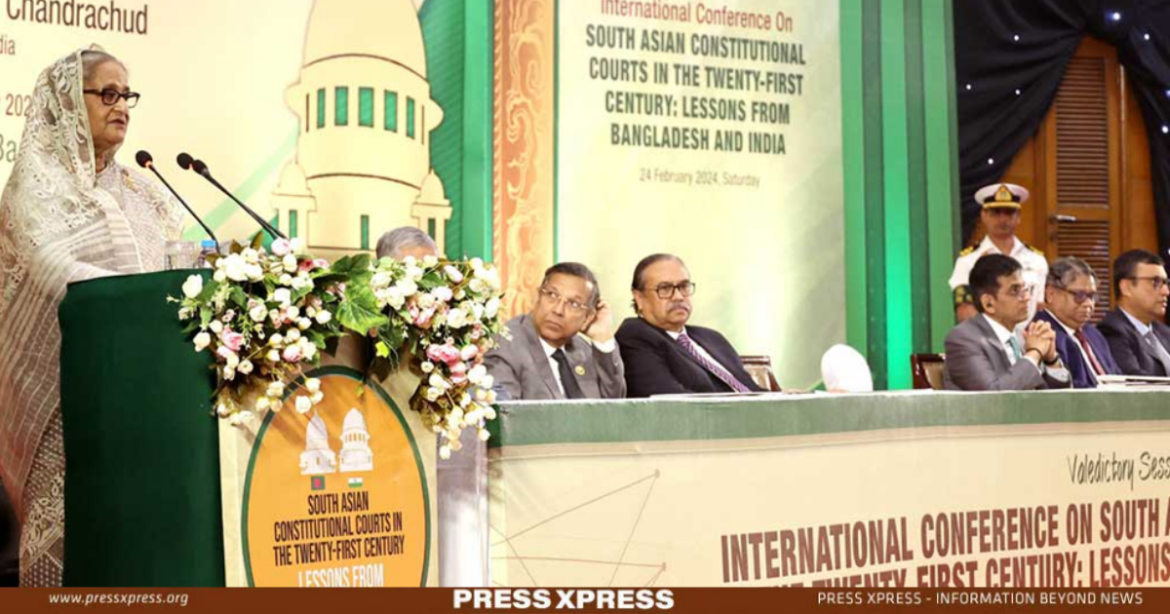- The judiciary is the last hope for restoring the rights of citizens in a country
- An independent judiciary, strong parliament, and administration can take a country towards development
- Bangladesh has achieved recognition as developing country effective from 2026
- Govt aims to make Bangladesh a developed and prosperous by 2041
In the landscape of good governance, the judiciary stands for citizen’s protection and rights seeking stronghold. Yet, for this institution to serve its purpose effectively, it must operate free from external influences and interferences. Prime Minister Sheikh Hasina, echoing the sentiments of her predecessors, emphasizes the critical role of an independent judiciary in propelling national growth and ensuring the welfare of citizens.
You can also read: PM Sheikh Hasina Assures Abundant Supply for Ramadan Essentials
Referring to the convictions of past leaders, Prime Minister Sheikh Hasina affirmed the indispensability of an autonomous judiciary in fostering national progress and securing citizen wellbeing during the closing ceremony of the International Conference on ‘South Asian Constitutional Courts in the Twenty-First Century: Lessons from Bangladesh and India’. At the Bangabandhu International Conference Center (BICC), she reinforced her government’s dedication to honoring the tenets established by the Father of the Nation, Bangabandhu Sheikh Mujibur Rahman.

Highlighting the significance of an independent judiciary, the Prime Minister stressed its symbiotic relationship with a resilient legislature and executive branch in driving the nation forward. Her remarks were grounded in concrete actions undertaken by her administration, such as separating the judiciary from administrative control through distinct funding mechanisms and establishing an independent Election Commission. By doing so, she demonstrated her government’s steadfast resolve to maintain the integrity of both institutions.

Empowering the Judiciary
Reflecting on her government’s initiatives, Prime Minister Hasina highlighted the measures taken to ensure the autonomy of the judiciary. Notably, she emphasized the separation of the judiciary from the administration, a move aimed at bolstering its independence. This separation is not merely symbolic but is substantiated by the allocation of a distinct budget for the judiciary, liberating it from previous dependencies on the government for financial matters.
In addition to empowering the judiciary, Prime Minister Hasina’s administration has enacted legislation to fortify other democratic institutions, such as the Election Commission (EC). Previously tethered to the Prime Minister’s Office, the EC now operates autonomously, with separate funding allocated to uphold its independence. This commitment to democratic principles is further underscored by constitutional amendments aimed at safeguarding against the illegal usurpation of state power.

Vision for National Development
Looking towards the future, Prime Minister Hasina articulated her government’s vision for Bangladesh. With the country poised to achieve recognition as a developing nation by 2026, she outlined ambitious plans for steering Bangladesh towards becoming a developed and prosperous nation by 2041. This aspiration, she asserted, is not merely a political rhetoric but a tangible commitment to realizing the ideals espoused by Bangabandhu Sheikh Mujibur Rahman.
The valedictory session witnessed the participation of esteemed dignitaries, including Chief Justices from Bangladesh and India, as well as key figures in the realm of law and justice. Their collective insights and collaborative endeavors underscored the importance of fostering regional cooperation and knowledge exchange in advancing the cause of justice and democracy.
Historical backdrop of separation of the judiciary
The issue of separating the judiciary has persisted in Bangladesh for nearly 176 years, originating from the era of British and Pakistani rule. Despite various proposals and legislative efforts, concrete action towards judicial independence remained elusive. Notably, attempts were made in 1900 by CW Bolton and in 1908 by Sir Harvey Adamson, but these initiatives did not materialize.
In 1921, the Legislative Council of Bengal unanimously supported separation, yet no action followed. Post-partition, West Pakistan experimented with segregation, but East Pakistan did not follow suit. The enactment of the Criminal Procedure (East Pakistan Amendment) Act in 1957 remained unenforced, and subsequent political changes hindered progress.
Efforts continued after Bangladesh’s independence in 1971, with Article 22 of the Constitution addressing segregation. However, bureaucratic resistance persisted. The Fourth Amendment in 1975 centralized control, but subsequent administrations, including General Ziaur Rahman’s and General H.M. Ershad made partial attempts at reform without substantial success.
In 1990, promises were made within the Tri-Alliance framework, and salary discrepancies within the judiciary sparked further demands for reform. Despite committees and discussions, concrete action remained elusive until the landmark Masdar Hossain case.
In 2001, the government once again lodged a review petition against the Appellate Division’s verdict dated December 2, 1999. Following an extensive hearing, the Appellate Division dismissed the review petition on June 18, 2001, mandating the government to adhere to the Supreme Court’s 12-point directive.
November 1, 2007, marked a significant milestone for the Judiciary as 71 judges from both the Appellate Division and the High Court Division collectively issued a historic judgment in the Masdar Hossain case. This judgment enforced the Criminal Procedure Act, heralding the official commencement of an independent judiciary in the history of Bangladesh.
While the judiciary has been constitutionally separated from the executive since Bangladesh’s founding, complete independence remained elusive due to continued executive interference until the Masdar Hossain case in 2007.
Despite these advances, challenges persist regarding executive interference, and ongoing efforts seek to address remaining issues.
Prime Minister Sheikh Hasina affirmed the importance of an independent judiciary in Bangladesh’s development, highlighting efforts initiated under her leadership to ensure judicial independence. These measures include separating the judiciary from the administration, financially supporting the judiciary independently, and implementing reforms to protect the fundamental rights of citizens.


